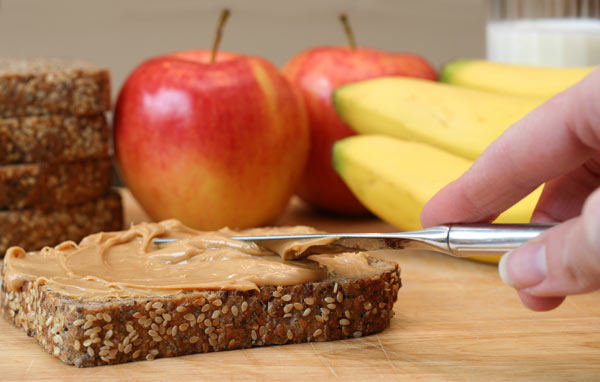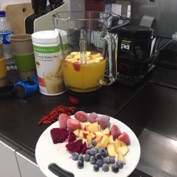
Posted by Susan Bowerman, M.S., RD, CSSD, CSOWM, FAND – Senior Director, Worldwide Nutrition Education and Training
The right fuel before you work out might help you perform at your best.

Do you love your morning workouts but hate to eat breakfast before heading out? Do you forget to have an afternoon snack before your evening run? One of the keys to good exercise performance is eating the right foods at the right time. That’s why it’s always amazing to me how many athletes simply don’t pay attention to what they eat (if they even eat at all) before they work out. After all, these are folks who should know better.
Why You Should Eat Before a Workout
If you’re headed out on a road trip, it’s a good idea to start out with a full gas tank. Maybe you gassed up a couple of days ago and you’ve still got some fuel in the tank. But if you’re smart, you’ll top it off before you go so you don’t run the risk of running out. Same thing goes with your body’s engine. If you swim laps for an hour first thing in the morning, you might figure you’ve still got enough fuel in your tank from last night’s dinner. You might—but you’d probably be a lot better off if you topped off the tank before heading to the pool.
Your body relies on a good store of carbohydrate to maintain blood sugar while you exercise. But after an overnight fast, those stores could be running low. What you eat before a workout should help provide enough fuel for working muscles. There’s a practical reason for eating before a long workout, too: it keeps you from getting hungry while you work out.
What You Should Eat Before a Workout
Since carbs are so important to your body’s engine, what you eat before a workout should be relatively high in carbohydrate. A little bit of protein is good, too. It will slow digestion—just enough to allow the carbs to enter the bloodstream a little more slowly and steadily. But you don’t want to eat a lot of fat right before you head out—it can slow digestion too much and leave you feeling uncomfortably full. And save your high fiber foods for afterwards, since they also take a while to work their way through your system.
As far as what specific foods to eat before a workout, there are no hard and fast rules. A smoothie made with fruit, milk and protein powder works well if you’ll be working out relatively soon after eating. A turkey sandwich and a bowl of soup at lunch will be pretty well digested if you’re going for a run in the mid-afternoon. If you work out in the mornings but you just don’t like breakfast foods, then eat whatever appeals to you. Most people don’t see anything ‘wrong’ with eating a bowl of cereal for dinner, so why should it be ‘wrong’ to eat leftovers for breakfast?.
When You Should Eat Before a Workout
There are specific guidelines for meal timing, but in reality you have to go with what feels right. Some people can eat as usual for their pre-workout meal, while others prefer a lighter load in the stomach. Generally speaking, the longer you have to digest your meal before you start working out, the larger and more solid your meal can be.
If you’re going to be working out within an hour after eating, then you’ll want a small, semi-solid or liquid meal. A smoothie, for example, would be light and easy to digest. If you’re going to work out in the mid-afternoon, a regular, well-balanced meal at lunch should have you covered. If you’ve got a hard workout scheduled right before dinner, you’ll need a light snack in the mid-afternoon—a carton of low-fat yogurt with some fruit would work.
How Much You Should Eat Before a Workout
Some athletes like to know exactly what they should eat before a workout, and the guidelines are very specific. Most people just use the ‘trial and error’ method until they figure out the eating schedule that works for them.
Training athletes are advised to eat between 1 and 4 grams of carbohydrate per kilogram of body weight (or, 0.5 grams of carbohydrate per pound of body weight), one to four hours before exercising. The reason for the range is that it depends on how soon you’re going to exercise after eating. The longer you have to digest, the more you can eat for your pre-workout meal.
- 1 hour to digest before exercise 1 gram carbohydrate/kg body weight
- 2 hours to digest before exercise 2 grams carbohydrate/kg body weight
- 3 hours to digest before exercise 3 grams carbohydrate/kg body weight
- 4 hours to digest before exercise 4 grams carbohydrate/kg body weight
Don’t Eat More Than You Burn
One final note: If your workouts aren’t particularly vigorous or lengthy, this advice may not apply to you. Not everyone needs to fuel up before exercising. If your routine consists of a 30-minute brisk walk in the morning, that’s a great regimen—but it’s also not so intense that you need to top off your tank before you head out.
Following is my own eating routine
by Angelo Locher, certified Personal Trainer
As Susan Bowerman already mentioned – it depends on your individual feeling. Meaning – you need to feel good for the exercise. Therefore, the guideline helps you to narrow down, but you will still need to “test” it on yourself.
For Cardio in the morning
Fore example: If i plan a typical cardio routine like running or a HIIT session early in the morning, i prefer fasted. However, if my exercise last longer than 2hr i will make a point to eat something AND still have enough digestion time (getting up very early in the morning….)
Weight lifting exercise (mostly in the gym)
I plan my weight bearing exercise either for lunch or late afternoon. The meal before my gym time will consist of enough carbohydrates to have enough energy to lift the weights AND enough digesting time
Feel the difference
Test it on your self. Do a 5k run with to much food – you won’t feel very comfortable. Do a weight bearing exercise with now food – you will not have enough energy for a optimal workout.
Talk to me for more details
I’m happy to guide you through your “testing” time to optimize your nutrition intake to lead you to your desired results. Results you’re looking for can be:
- more strenght
- leaner body (less fat)
- fat burning
- weight loss or weight gain
- improving health and fitness level

Leave a Reply
You must be logged in to post a comment.